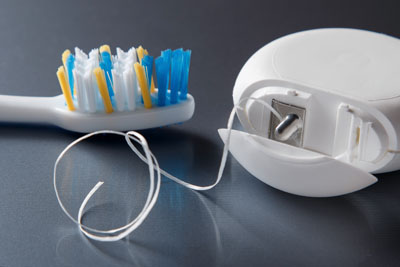How Many Times Should You Floss Each Day?

According to the American Dental Association, you should floss your teeth at least once a day.
Cleaning the tight spaces and crevices between your teeth helps to keep gum disease and cavities at bay. It also helps to remove food particles and plaque from your teeth.
Millions of bacteria that live in plaque convert food particles in your mouth into acids that can damage the enamel of your teeth and lead to gum disease.
Brushing your teeth is an effective way to remove most of the food particles and plaque on your teeth, but there are many tight spaces in your mouth that no toothbrush can reach. Flossing helps to keep these tight spaces as clean as the rest of your teeth.
If plaque is left on your teeth and not removed by flossing and brushing, it will eventually harden into tartar. This is a hard, yellow substance that gives your teeth a yellow tint. Tartar also facilitates tooth decay and gum disease. Tartar cannot be removed by brushing and flossing, and it requires a professional tooth cleaning by a dentist.
When should you floss? Before or after brushing?
When it comes to your oral hygiene, the most important thing is that you brush and floss daily. The time of day you decide to do it does not usually matter much. It is okay if you decide to floss first thing in the morning, right after lunch, or right before you go to bed. It is really a matter of preference. Most people like to start the day with a clean mouth and fresh breath, but there is no rule that says you need to brush or floss first thing in the morning.
What can be beneficial to your oral health is scheduling cleaning times after you have eaten. Especially if you are consuming things that are not particularly good for your teeth.
Figuring out the right things to clean your teeth with
It is tempting to use anything you can find to clean your teeth when there is something stuck between them. Items people often use to clean out their teeth include cards, fingernails, cutlery, and safety pins.
Besides being a lot less effective than dental floss, many of these items can damage your teeth and gums. Always try to stick with tools that are for cleaning the spaces between your teeth like string floss, dental picks, water flossers and specialized brushes.
All of these specialized tools have their purpose. For example, water flossers are a great option if you have dental prosthetics that make it difficult to floss like bridges or braces, while toothpicks can help you remove food particles from hard to reach places. Most people tend to use a combination of these tools to clean the spaces between their teeth daily.
In Conclusion
Flossing should be an integral part of your daily oral care routine. It'll help you keep tooth decay and gum disease at bay. Want more tips on how to properly take care of your teeth? Contact a dentist today.
Please call Visalia Care Dental today at (559) 975-1213 or go to https://www.dentistofvisalia.com for more information!
Related Posts
Keep your smile shining bright with oral hygiene basics and regular checkups at our dental office.Taking care of your teeth requires more than receiving a dental cleaning at least once every six months. It is crucial to keep regular oral hygiene routines at home with brushing twice a day and flossing once a day. Along…
Flossing before brushing will help keep the space between teeth clean and prevent plaque buildup.When it comes to cleaning the teeth, most people may not realize that there is an order you need to follow. In fact, many people aren't aware of the crucial oral hygiene basics that can help your teeth remain healthy. While…
Most people have heard about fluoride and know it plays a role in dental health, but many do not understand why fluoride is helpful, which leads to not implementing fluoride into their oral care routine.Understanding how to use flouride to your advantage can have fantastic benefits.There are several benefits — and perhaps a single concern — of…
For many of us, the use of oral rinses is one of the three steps of cleaning our teeth. That is why it is so important to learn about oral rinses. What are their uses and benefits? How do we choose the best one?All these questions are answered in this simple guide to oral rinses.There…
